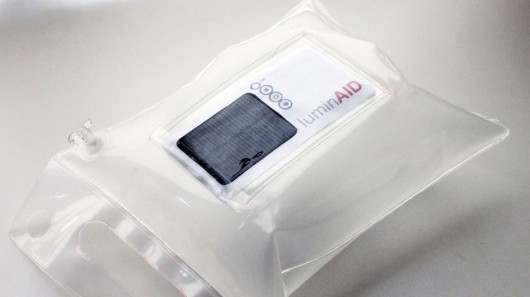
Although it can be considered as a basic human need alongside food, water and shelter, 1.6 billion people all over the world have no access to stable and safe source of light. It’s a situation that two bright young Architecture graduates are aiming to combat with the LuminAID solar-powered lantern. Like the Solar Pebble initiative, the LuminAID lantern is designed to address dependence on kerosene lamps in the developing world and its extremely lightweight and easy to transport inflatable design is also targeted at use in disaster relief situations … plus it makes a very handy addition to your camping kit.
At first glance the LuminAID resembles a simple plastic bag, but its coating is made of flexible, semi-transparent waterproof material with a printed dot matrix to diffuse light and it incorporates a very thin solar panel, bright LEDs that provide the light source and a reinforced handle for easy carrying.
LuminAID is fully charged after 4-6 hours in sunlight makes and is reportedly good for up to four hours of lighting at 35 lumens, or up to six hours at 20 lumens. The battery can be recharged 800 times.
Founded by Anna Stork and Andrea Sreshta, both graduates from the Columbia Graduate School of Architecture, Planning & Preservation in New York LuminAID Lab is currently field testing the inflatable lamp is in Rajasthan, India, where fifty percent of households lack electricity. It’s being distributed to rural schools, homes and small-business owners.
LuminAID Lab says 100 percent of funds will go to producing and distributing the LuminAID lights to you and to our community projects.
It’s possible to back LuminAID project by purchasing the lamp via on IndieGoGo. A pledge of US$25 results in purchasing two units – someone in need will obtain one lamp for free, while you’ll get your own too.
For US$50 you get a carabiner and a LuminAID t-shirt (Adventure Pack), or print pattern on the coating designed by graphic designer Hillary Cribben as well. You can also back the project by US$10 without obtaining a lamp, or donate a larger sum (US$100 – 1,000) to purchase multiple lamps. The production of lamps will take 45-60 days.
Via: gizmag
 Follow
Follow